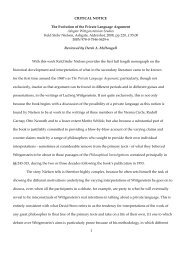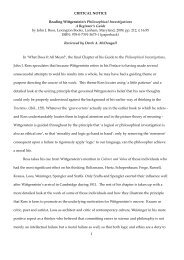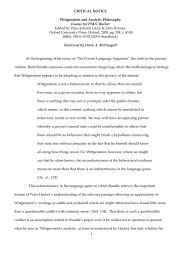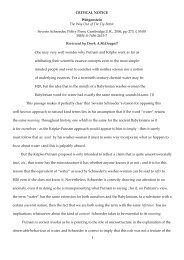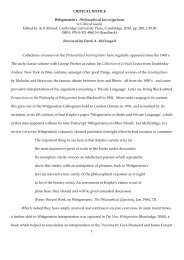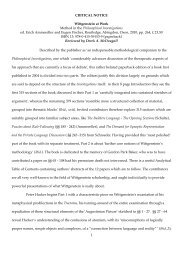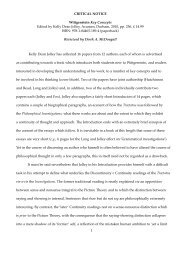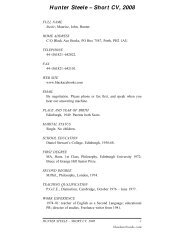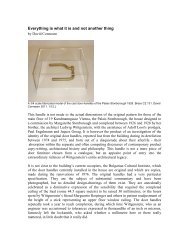CRITICAL NOTICE The Enchantment of Words Wittgenstein's ...
CRITICAL NOTICE The Enchantment of Words Wittgenstein's ...
CRITICAL NOTICE The Enchantment of Words Wittgenstein's ...
You also want an ePaper? Increase the reach of your titles
YUMPU automatically turns print PDFs into web optimized ePapers that Google loves.
and James Conant two decades ago, in which nonsense becomes plain nonsense or sheer gibberish.<br />
What the Tractatus reveals on this view is the reader’s susceptibility to a number <strong>of</strong> illusions which<br />
Wittgenstein carefully allows him to become aware <strong>of</strong> in the act <strong>of</strong> undermining a metaphysical<br />
viewpoint which is really only an apparent and not a genuine feature <strong>of</strong> the text.<br />
McManus describes the toing and froing <strong>of</strong> the argument between those advocating<br />
what has become known as a resolute response to 6.54, and its traditional opponents, who would<br />
claim that if the resolute response is correct, it turns the Tractatus into a joke, instead <strong>of</strong> a serious<br />
contender for the title <strong>of</strong> one <strong>of</strong> the most pr<strong>of</strong>ound works in the Western Philosophical canon. <strong>The</strong><br />
anti-traditionalists would regard it as a poor argument, however, to respond by claiming that the<br />
book reads as a piece <strong>of</strong> real metaphysics, since the resolute response to this is that in so regarding it,<br />
the reader is merely showing that he has been taken in by the illusion <strong>of</strong> sense which Wittgenstein<br />
intends that he will in time be able to outgrow. McManus draws our attention to the overwhelming<br />
desire on the part <strong>of</strong> traditional interpreters to point to Wittgenstein’s later comments indicating<br />
that nowhere does he leave the impression that he intended the work to be anything less than a<br />
serious metaphysical treatise. <strong>The</strong> answer which McManus describes Diamond & Conant as having<br />
provided to this charge is that Wittgenstein later recognised that he had unwittingly incorporated<br />
certain metaphysical proposals in the book which were quite unintended. On the face <strong>of</strong> it this<br />
sounds at the very least a trifle disingenuous.<br />
A more serious suggestion in favour <strong>of</strong> the resolute proposal is that throughout his life<br />
Wittgenstein believed that philosophical problems ought to be dissolved rather than solved, so<br />
that the appropriate response to a philosophical problem is not the creation <strong>of</strong> a theory but the<br />
identification <strong>of</strong> the locus <strong>of</strong> the confusion giving rise to a puzzle that is only apparent rather than<br />
real (Ibid., 47). In fact, McManus believes that ‘Wittgenstein’s demonstration <strong>of</strong> how we come to<br />
reach for “the unsayable” is something that is meant to help us see the confusion in whose grip we<br />
are thinking’ (Ibid.,48). This is consistent with his claim not only that the story about the Tractatus<br />
that he wishes to provide does not require a ‘theory <strong>of</strong> meaning’, but also that none <strong>of</strong> the existing<br />
20



